Volyn
Волинь
Volyn
Волинь

Volyn during various periods of history
(Original here or download here)
Volyn throughout history
Like many parts of Ukraine, Volyn has had a long and convoluted history. The area first appears in historical texts in the times of Kyivan Rus, as the lands of the Derevlyans and Dulibyans were incorporated into the empire. After the fall of Rus, Volyn, along with neighboring Halych, formed Halych-Volynia between the 12th and the 14th centuries.
After 1569 Volyn formed a province of the Polish-Lithuanian Commonwealth. During this period Poles and Jews settled in the area. Roman and Greek Catholic churches became established in the province, and many Orthodox churches were forcibly annexed by the latter.
(Left: Mezhyrich Abbey in Ostroh was endowed by the Ostrohski princes in the 15th century.)
(left: Pochayiv Lavra, the spiritual heart of the Orthodox in Volyn.)
In 1921, after the end of the Polish-Soviet war, the treaty known as the Peace of Riga divided Volyn between Poland and the Soviet Union. Poland took the larger part and established a Volynian Voivodeship. Most of eastern Volyn became part of the Zhytomyr Oblast.
From 1935-38 Joseph Stalin had the Poles of Eastern Volyn deported — the first ethnic deportation in the history of the Soviet Union.Following the signing of the Molotov-Ribbentrop Pact in 1939, and the subsequent invasion and division of Polish territories between the Reich and the USSR, Volyn was occupied by the Soviet Union.
Volyn was a battleground during WWII, after the Nazis invasion and occupation in June of 1941. The Ukrainian Insurgent Army, a guerilla army, was formed here, and fought the Germans, Poles and Russians during the course of the war. The Jewish population was largely exterminated by the Nazis, and many Ukrainians were forcibly moved to Germany as guest workers.
Volyn was annexed to Soviet Ukraine after the end of World War II. Most of the remaining ethnic Polish population were expelled to Poland in 1945. Since the collapse of the Soviet Union, Volyn has been an integral part of Ukraine.
The map at the top of the page purports to show Volyn throughout its history. It was created, though, by the Aratta people, who have interesting views of Ukrainian pre-history. The last four lines in the translated key below (beginning with solid purple) are from historical times, and accurate.

XI century B.C. as part of Hyperborea
Movements of the Dulibyany VI to II centuries BC
Borders of the Dulibyan Union at its founding, I to II century AD
Borders of the Dulibyan Union VII century AD
Location of the holy Dulibyan city or Surenzh-Arta
Volynian lands under Kyiv-Rus in XI-XII centuries AD
Volynian Voivodeship VI-VII centuries AD
“Volyn” on a French map from 1700 AD
Volynian Gubernia (Russian occupation) XIX-XX centuries AD
The modern borders of Volyn, within an independent Ukraine, are pictured below. The oblast border were established in Soviet times, often ignoring (some claim this was done purposefully) ethnic borders. On this first map, the yellow areas are ethnic Volynian; significant areas are now a part of Belarus, and, to a lesser extent, Poland. Within Ukraine, Volyn and Rivne oblasts are entirely ethically Volynian, and Zhytomyr, Khmelnytsky and Ternopil oblasts have fairly large Volynian populations. Although not clearly visible in this map, small areas of northern Lviv oblast, particularly in Sokal raion, are also traditionally Volynian, including my ancestral village.
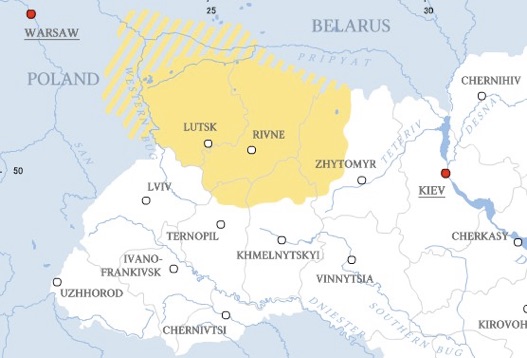
Ethnic Volynian lands and their current political status
These maps show the internal borders of Volyn, Rivne, Zhytomyr, Ternopil and Khmelnytsky oblasts, with the raiony (and their administrative centers) shown.
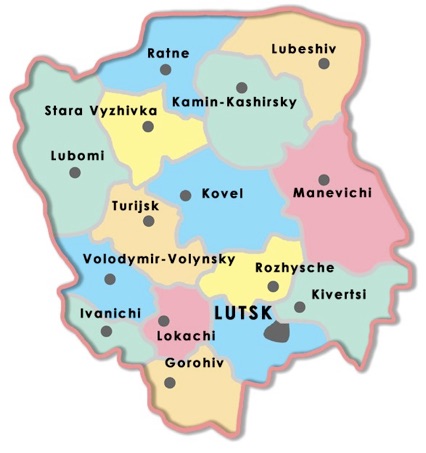
Modern administrative districts (raiony) of Volyn oblast
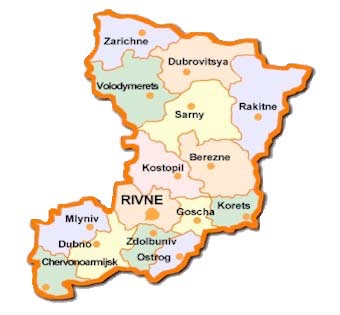
Modern administrative districts (raiony) of Rivne oblast
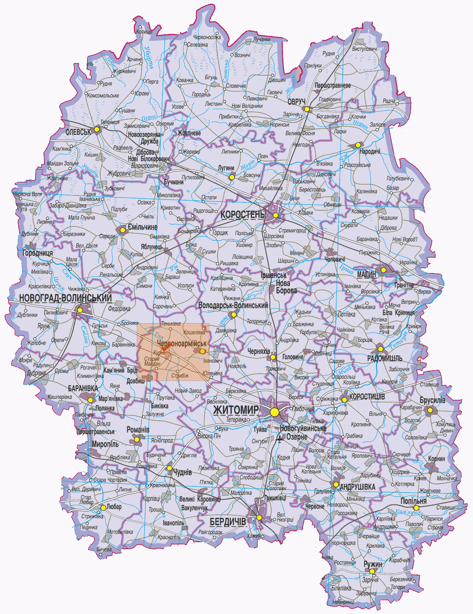
Modern administrative districts (raiony) of Zhytomyr oblast
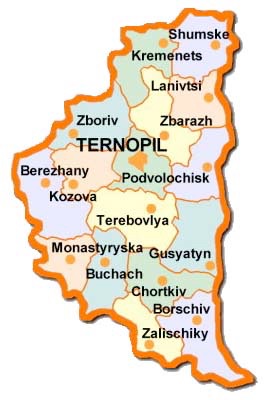
Modern administrative districts (raiony) of Ternopil oblast
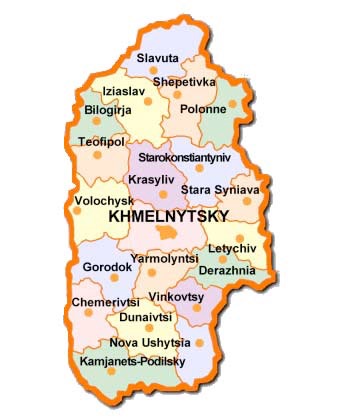
Modern administrative districts (raiony) of Khmelnytsky oblast
Back to Volyn Home
Back to Western Ukraine Home
Back to Regional Pysanky Home
Back to Traditional Pysanky HOME
Search my site with Google
